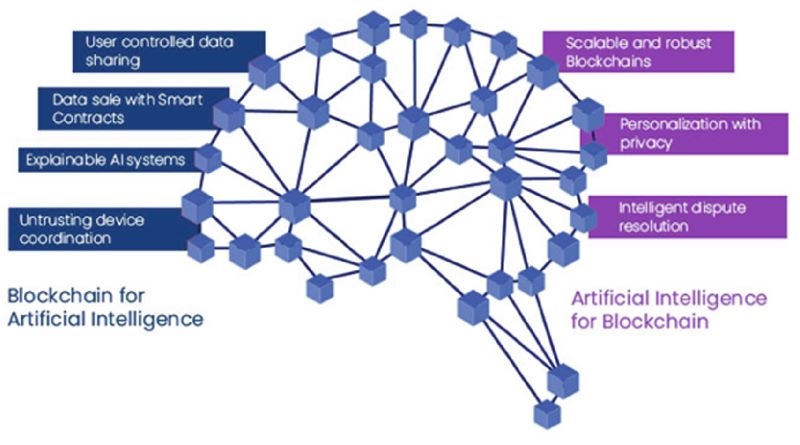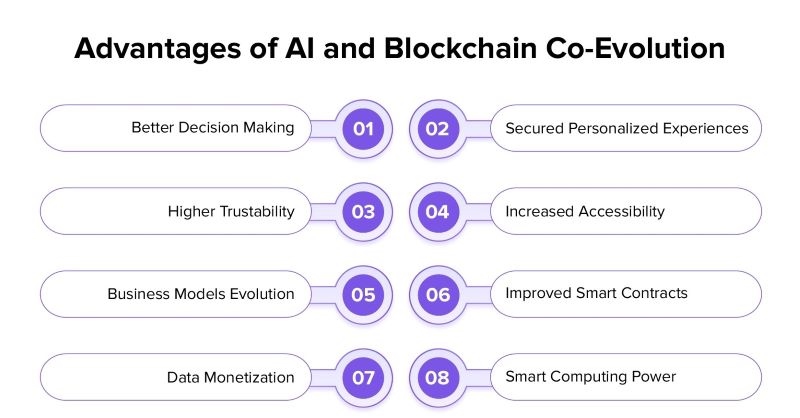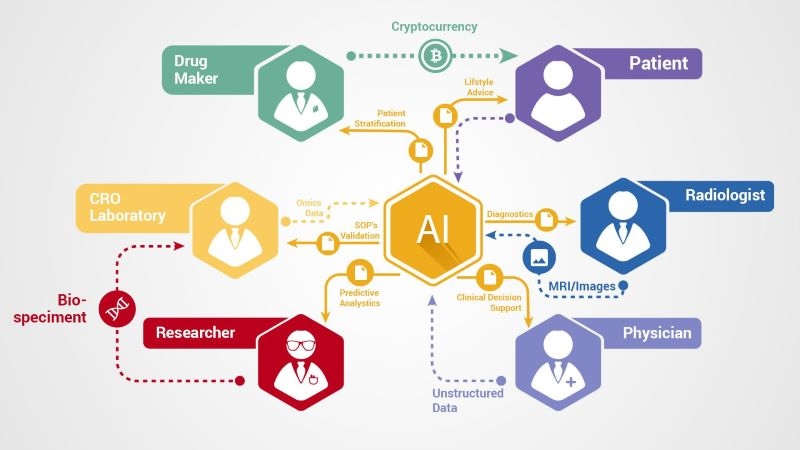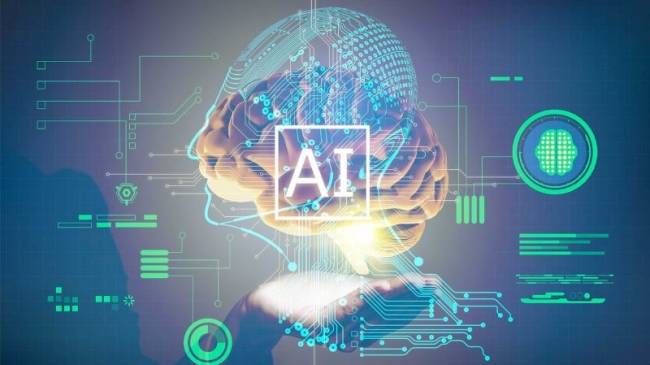Categories: Blockchain
How to integrate AI with blockchain? What integration methods are there?
Artificial Intelligence (AI) and blockchain, two groundbreaking technologies of our time, create a formidable force when combined. Have you wondered how to integrate AI with blockchain to develop exceptional applications?
Artificial Intelligence (AI) and blockchain, two groundbreaking technologies of our time, create a formidable force when combined. Have you ever wondered how to integrate AI with blockchain to develop exceptional applications? Let's explore the integration methods of AI and blockchain, opening the door to a world full of potential and opportunities. From optimizing supply chains to creating secure and transparent decentralized financial systems, this combination is reshaping the future of technology and business.
Table of Contents
Introduction to integrating AI with blockchain
Have you ever wondered what breakthroughs could arise from the fusion of artificial intelligence (AI) and blockchain technology? The potential synergy between these two rapidly advancing fields holds the promise of significant innovation and transformative applications.
Artificial intelligence (AI) involves machines simulating human cognitive functions such as learning, reasoning, and problem-solving. It is reshaping industries by enabling automation, predictive analytics, and personalized user experiences.
Blockchain, on the other hand, is a decentralized digital ledger technology known for its transparency, security, and immutability. Originally developed for cryptocurrencies, blockchain now extends its applications to secure transactions, smart contracts, and decentralized applications (DApps).

This article aims to provide a comprehensive guide on how to integrate AI with blockchain, highlighting the potential benefits and challenges associated with this integration. By exploring the synergies between AI and blockchain, we aim to uncover opportunities for enhanced data security, transparency, and efficiency in various sectors.
Why Integrate AI with Blockchain?
Both artificial intelligence (AI) and blockchain technology face distinct limitations:
AI: AI systems often operate opaquely, making it difficult to trace decisions and ensure data transparency. They are also vulnerable to data breaches and cyberattacks due to centralized data storage and processing.
Blockchain: While blockchain ensures data integrity and security through decentralization and cryptographic techniques, it struggles with scalability and transaction speed, especially when handling large volumes of data.

However, these technologies complement each other in significant ways:
Blockchain: Provides a transparent, immutable, and secure data platform that enhances data integrity and trust. By leveraging blockchain's decentralized ledger, AI systems can access validated data sources, reducing the risks of data manipulation and ensuring data reliability.
AI: Enhances the efficiency of blockchain networks by analyzing large datasets more effectively. AI algorithms can extract valuable insights, detect patterns, and optimize processes within blockchain systems, thereby improving decision-making capabilities and operational efficiency.
Integrating AI with blockchain not only addresses the limitations of each technology but also unlocks new possibilities for innovation and efficiency across various industries. This synergy enables enhanced data security, transparency, and efficiency, paving the way for transformative advancements in the digital landscape.
Methods to Integrate AI with Blockchain
The integration of AI and blockchain can be achieved through various models, each with its own advantages and drawbacks. Understanding these models is crucial for determining the most suitable approach for specific applications.

Centralized model
In this model, AI is trained and operated on a centralized server, utilizing data sourced from the blockchain. This approach offers simplicity and cost-effectiveness in implementation, making it accessible for many projects. However, it sacrifices some of the inherent security and decentralization benefits of blockchain, as the AI model and data remain under the control of a single entity.
Advantages: Easy deployment, low cost.
Disadvantages: Low security, dependency on third parties.
Decentralized model
This model involves training and running AI on a decentralized network of nodes. This approach prioritizes security and transparency, as no single entity controls the AI model or data. However, decentralized AI models can be more complex and costly to implement, requiring robust infrastructure and coordination mechanisms.
Advantages: High security, transparency, independence from third parties.
Disadvantages: Complex implementation, high cost.
Hybrid model
As the name suggests, this model combines elements of both centralized and decentralized approaches. It offers flexibility by allowing certain AI components to be centralized for efficiency, while others are decentralized for security and transparency. However, this hybrid nature can lead to increased complexity in development and management.
Advantages: Flexibility, balance between security and efficiency.
Disadvantages: Complexity.
Real-World Use Cases
Supply Chain Management
Tracking and Optimizing Supply Chain: AI and blockchain can be used to track and optimize supply chain operations, ensuring transparency and efficiency.
Healthcare
Electronic Medical Records Management: Blockchain can be used to manage electronic medical records, ensuring data security and integrity.
Healthcare Data Analysis: AI can be used to analyze healthcare data, leading to new medical discoveries and improved patient care.
Developing New Medicines: Blockchain can be used to develop new medicines, ensuring transparency and security in the development process.

Finance
Automating Financial Processes: Blockchain can be used to automate financial processes, reducing the risk of fraud and improving efficiency.
Fraud Detection: AI can be used to detect fraud in financial transactions, ensuring the integrity of financial systems.
Risk Management: Blockchain can be used to manage financial risks, ensuring that financial institutions are protected from potential losses.
Energy
Smart Grid Management: Blockchain can be used to manage smart grids, ensuring efficient and secure energy distribution.
Peer-to-Peer Energy Trading: Blockchain can be used to enable peer-to-peer energy trading, allowing individuals to buy and sell energy directly.
Other Industries
Education: Blockchain can be used to manage educational records, ensuring data security and integrity.
Real Estate: Blockchain can be used to manage property ownership and transactions, ensuring transparency and security.
Identity Management: Blockchain can be used to manage identity verification, ensuring secure and private data storage.
Challenges and future development potential in integrate AI with blockchain
Integrating AI with blockchain poses challenges such as scalability, interoperability, and regulatory compliance. Blockchain networks must scale to manage AI's substantial data processing demands. Seamless interoperability between diverse blockchain platforms and AI models is essential for broad adoption. Additionally, navigating the evolving regulatory landscape for AI and blockchain presents ongoing hurdles for developers and businesses.
Despite these challenges, the future holds promise. The convergence of AI and blockchain promises groundbreaking solutions across industries. AI-driven smart contracts could automate intricate processes, with blockchain ensuring transparency and data integrity in AI decision-making. Continued advancements in both technologies suggest a future where their integration drives innovation and reshapes sectors.

The integration of AI with blockchain is a dynamic and promising field with the potential to revolutionize numerous industries. By combining AI's data processing and decision-making capabilities with blockchain's security, transparency, and decentralization, we can unlock new levels of efficiency, trust, and innovation.
Whether through centralized, decentralized, or hybrid models, integrating AI with blockchain offers a wide range of possibilities for creating intelligent, secure, and autonomous systems. Applications span from optimizing supply chains and advancing healthcare to enhancing financial services and managing energy resources, showcasing the breadth of potential impacts.
While challenges like scalability, interoperability, and regulatory compliance persist, the future of AI and blockchain integration looks bright. As these technologies mature and evolve, we anticipate more groundbreaking solutions that will reshape how industries operate.
Trends and future development potential of AI and Blockchain integration
Autonomous AI on Blockchain The future of AI and blockchain will witness the development of Autonomous AI systems operating on blockchain platforms. These systems are capable of self-learning, making decisions, and executing actions autonomously without human intervention. Blockchain ensures transparency, security, and immutability of AI decision-making processes, while facilitating control and monitoring of autonomous AI systems.
Generative AI on Blockchain Generative AI is a burgeoning field focusing on creating new content such as images, audio, text, and even code. When integrated with blockchain, Generative AI can be used to create unique and valuable Non-Fungible Tokens (NFTs), ensuring authenticity and ownership rights of creative works.
Decentralized AI Decentralized AI is a novel model where AI models are trained and operated on a network of distributed nodes, rather than centralized on a single server. This model offers advantages such as enhanced security, reduced risk of attacks, and ensures fairness and transparency in AI decision-making processes.
Integration of AI and Blockchain in Web3 Web3, the next generation of the Internet built on blockchain, promises a decentralized, transparent, and secure online environment. The integration of AI and blockchain in Web3 will create new applications and services, offering users a better experience and opening up new business opportunities.
AI and Blockchain in the Metaverse The Metaverse, a virtual world connected to the real world, is becoming a new technology trend. The combination of AI and blockchain in the Metaverse can create more vivid and realistic experiences, while ensuring ownership rights and safe, transparent transactions of digital assets.
Applications of AI and Blockchain in New Fields Beyond the mentioned fields, AI and blockchain have broad potential applications in sectors such as agriculture, education, tourism, and entertainment. Applying AI and blockchain in these areas can enhance efficiency, reduce costs, and create new experiences for users.
The fusion of AI and blockchain is not merely a technological trend, but a transformative force reshaping our interaction with data, automation of processes, and construction of decentralized systems. While challenges exist, the potential of this synergy is undeniable, raising questions like "how to integrate AI with blockchain" to maximize their combined benefits.
As both technologies mature, we anticipate groundbreaking advancements, innovative applications, and unprecedented business models. Understanding how to integrate AI with blockchain will be pivotal in realizing intelligent, secure, and transparent systems that benefit individuals and businesses alike. Embracing and harnessing the potential of this integration is key to leading in this new technological era.
Refer to other helpful articles on U2U Network's website.
.png)